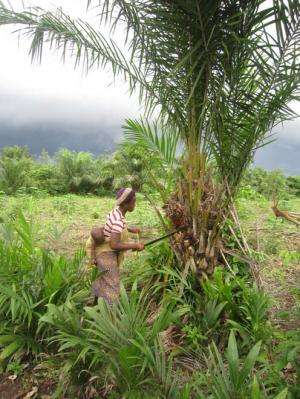Qualitative methods used to gather information on young child feeding practices in Benin

Qualitative data were collected in a study on infant and young child feeding in rural Benin in May 2013. This research aimed to improve understanding of complementary feeding practices of young children. It was conducted in the preparatory phase of the Work Package 4 in the FoodAfrica Programme.
Chronic child malnutrition is common in Benin. Over 40 percent of children under the age of five are stunted. One reason for this is inadequate diet during the first two years of child's life. Complementary foods that are given in addition to breast milk are often of poor quality and diversity.
Children's diets are usually studied using quantitative methods that measure, for example, nutritional value of the foods and heights and weights of children. Qualitative methodology that aims to improve understanding of local habits, beliefs, attitudes and reasons behind practice is rarely used.
"In this preparatory phase of the research project we chose different qualitative methods to provide us with a rich picture of the practices in the local context. Feeding practices were investigated using semi-structured interviews, focus group discussions and observations," says Project Researcher Anna Hiltunen from the University of Helsinki.
The sample included mothers who had a child 6 to 24 months old. Subjects were sampled in two villages located in different agro-ecological regions in the department of Mono in southern Benin. A total of 30 women were interviewed; 20 of them were also observed while they were feeding their children. Over 30 mothers attended the group discussions. Two groups were also organized for the local health care and social workers. Thirteen professionals attended the discussion and shared their views on the local feeding practices.
Cooperation between Finnish and Beninese academic institutions
This research was conducted in a partnership between the University of Abomey Calavi, Benin, Bioversity International and the University of Helsinki, Finland. It was felt that the collaboration was very successful. Mr Sam Bodjrenou from the University of Abomey Calavi gave his strong support in methodological questions and practical arrangements during the field work. The two Finnish Master's students, Ms Kirsi Ali-Kovero and Silja Nousiainen, focused on observations and focus group discussions respectively. Three professional translators were also recruited. They were trained and briefed before the data collection.
"This was extremely important because qualitative methods demand more flexibility and sensitivity not only from the researchers but also from the translators. The whole research team played well together and did a very good job," Hiltunen emphasizes.
Some results from the study are expected in the autumn and winter 2013 in the two Master's thesis work. The results from the preparatory phase will be used when tools for the larger research project are developed.
More information: www.mtt.fi/foodafrica


















